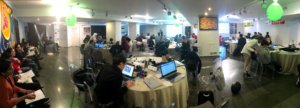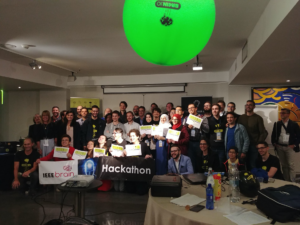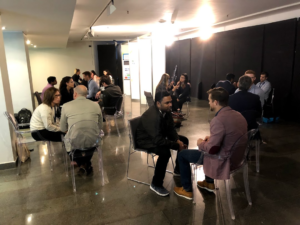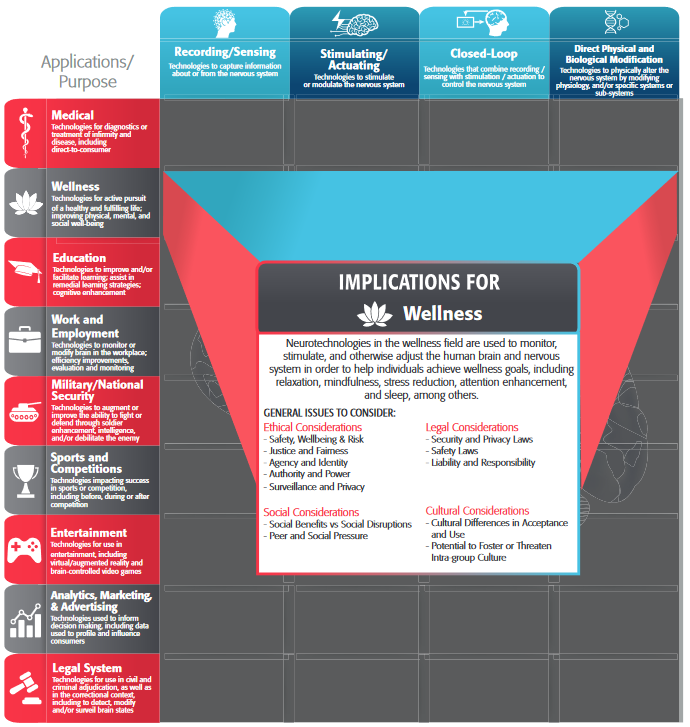EVENT
December 2019
Tiago H. Falk, Christoph Guger, Michael Smith, and Ljiljana Trajković
From October 6-9, 2019, the IEEE Brain-Machine Interface (BMI) Workshop was held in Bari, Italy, as part of the Annual IEEE Systems, Man, and Cybernetics (SMC) Society Conference. This is the flagship Workshop organized by the IEEE SMC Brain-Machine Interface Systems Technical Committee. The goal of the Workshop is to provide a forum for attendees to present recent research results, to interact with experts from around the world from both academia and industry, and to receive hands-on training across different aspects of the neurotechnology development chain. This year, the theme of the Workshop was “From Assistive Technologies to Affective Computing: What’s Next for Neurotechnologies?” Its focus was placed on how industry and industry-academia partnerships have been paving the road for next-generation BMIs.
The BMI 2019 program was comprised of special session paper sessions, poster sessions, tutorials, mini-workshops, a BR41N.IO brain-computer interface hackathon, a number of keynote and invited speakers, expert panels, as well as a student mentorship session. After careful peer-review by at least three experts in BMI-related fields, 87 full papers and 13 late-breaking research abstracts were accepted. They were presented in 13 oral and one poster session. The oral sessions covered emerging topics, such as deep and transfer learning for BMIs, BMIs for immersive environments as well as more classical topics such as neurotechnologies in the clinic, steady-state visually evoked potential BMIs, and multimodal BMIs “in-the-wild.” All full papers are now available in IEEExplore while the late-breaking abstracts may be found here. The IEEE Brain Best Paper Award was given to the paper entitled “A pBCI to predict attentional error before it happens in real flight conditions,” co-authored by Frederic Dehais, Rida Imad, Raphaelle Roy, Iversen John, Tim Mullen, and Daniel Callan. Five IEEE Brain Student Travel Awards were given to undergraduate and graduate students worldwide.
The Workshop featured three keynote speakers and four invited speakers. Dr. Maria Chiara Carrozza (Professor, Biorobotics Institute, Scuola Superiore Sant’Anna, Italy) presented a keynote on Human-Robot Integration for Rehabilitation and Personal Assistance. Dr. Febo Cincotti (Professor at the Sapienza University of Rome, Italy) presented a keynote on Design and use of Brain-Computer Interfaces in Neurorehabilitation. Lastly, Dr. Amy Kruse (CSO, Platypus Institute, USA) presented an industry keynote on Human 2.0: Neurotechnology-enabled Performance Enhancement. Invited speakers included Dr. Christoph Guger (CEO, g.tec, Austria), who presented Current and Future BCI Applications and Running Real-Time BCIs, Dr. Rossella Spataro (Neurologist at Università degli Studi di Palermo, Italy) presented BCIs for Assessment of Patients, Dr. José M. Azorin (Director of BMILab and Prof. at Universidad Miguel Hernández de Elche, Spain) presented BCIs for Interacting with Robots, and Dr. Alfred Emondi (Program Manager, DARPA Biological Technology Office, USA) presented An Overview of Select DARPA Programs Advancing Neural Interfaces for Functional Recovery. These talks attracted large crowds as illustrated in Figure 1.
For the fourth consecutive year, the BMI Workshop also featured a BR41N.IO Brain-Machine Interface Designers Hackathon. Hackathons are two-day brainstorming and collaborative marathons that create an environment supporting the rapid production of working prototypes. There were four winning teams after 24h of non-stop hacking. The IEEE Brain Award went to team Unibrowser who developed an SSVEP based BCI to make the decision process in Netflix easier. The 1st place winner was team Mind the Monkey who developed a BCI-based serious game to help treat ADHD in kids. The 2nd place winner was team Bring IT who developed a BCI to control drones for video surveillance. The 3rd place winner was team Mind Chasers who also used drones but this time as assistive technologies to fetch items for their users. A total of $US3,000 was given as cash prizes to the winners. More details about the hackathon may be found here. Figure 2 shows all hackathon participants and the jury members.
Right after the hackathon, we held our first ever hands-on demonstration session and reception open to all participants, which was sponsored by the SMC Vice President of Membership and Student Activities and the Vice President Human-Machine Systems. Hands-on demonstrations were given, including: BCIs embedded in virtual reality headsets, the winning 2019 Cybathlon BCI race system, and all hackathon projects, as well as real-time demonstrations from the seven exhibitors showcasing their EEG, fNIRS, and hybrid/mobile BCIs (see Figure 3).
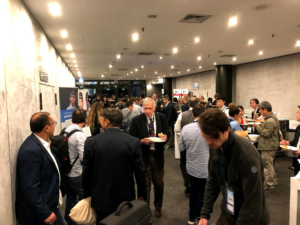
Figure 3. Hands-on demo session and reception cocktail sponsored by 2019 BMI Workshop, the SMC Vice President, Membership and Student Activities, and the Vice President, Human-Machine Systems.
New at this Workshop was also the industry panel that featured 11 leaders from corporations around the world, working on hardware and software aspects of BCIs, applications in clinical settings, human performance enhancement, neuroprosthetics, marketing and entertainment, as well as federal and private funding for neurotechnology research and standardization efforts by IEEE. After the panel, student participants met face-to-face with the panelists in order to obtain advice about pursuing professional careers in the various subsectors of the neurotechnology field. This mentorship session was also a first of its kind for the BMI Workshop and was well appreciated by everyone involved, as seen in Figure 4.
BMI 2019 featured a number of other enlightening events including an expert panel around the theme of AI, BMIs, and human-in-the-loop autonomous agents: co-existence or self-destruction?, a hands-on tutorial on Introduction to the Lab Streaming Layer (LSL), an open-source software framework used widely in the BMI field, and a mini-workshop on Standardization of Neural Interface Research to Accelerate Interoperability, Clinical Integration, and Commercialization of Neurotechnologies. On the last day of the Workshop, after four full days of events, talks, discussions, networking, and hands-on demonstrations, participants were treated to our very first “post-reception after the party,” sponsored by Intheon and Neocortex Ventures (Figure 5). Overall, BMI 2019 was a huge success due to the efforts of numerous volunteers. Thank you!
We conclude by announcing that 2020 will mark the 10th anniversary of the IEEE SMC BMI Workshop series. Several special events are being planned to celebrate this special occasion. We invite you to consider submitting your work to BMI 2020, which will be held in Toronto, Canada from October 11-14, 2020. Up-to-date Workshop news may be found here.
Authors’ Biographies
 Tiago H. Falk is an Associate Professor at INRS-EMT, University of Quebec, Canada. His research interests span all aspects of human-machine interaction in realistic environments, from signal processing and enhancement, to sensor fusion, and machine learning. He is Co-Chair of the IEEE SMC Brain-Machine Interface Systems Technical Committee. He will serve as General Co-Chair of SMC 2020 BMI Workshop. He also served as General Co-Chair of SMC 2018 and SMC 2019 BMI Workshops.
Tiago H. Falk is an Associate Professor at INRS-EMT, University of Quebec, Canada. His research interests span all aspects of human-machine interaction in realistic environments, from signal processing and enhancement, to sensor fusion, and machine learning. He is Co-Chair of the IEEE SMC Brain-Machine Interface Systems Technical Committee. He will serve as General Co-Chair of SMC 2020 BMI Workshop. He also served as General Co-Chair of SMC 2018 and SMC 2019 BMI Workshops.
 Christoph Guger studied electrical and biomedical engineering at the University of Technology Graz in Austria and Johns Hopkins University in the USA and received his Ph.D. in 1999. In 1999, he started the company g.tec, which has branches in Austria, Spain, USA, and Hong Kong. g.tec produces high-quality neurotechnology and real-time brain computer interfaces for the research, medical, and consumer markets. The company is active in many international research projects about brain-computer interfacing, neuromodulation, stroke rehabilitation, assessment and communication with patients with disorders of consciousness, and high-gamma mapping in epilepsy and tumor patients.
Christoph Guger studied electrical and biomedical engineering at the University of Technology Graz in Austria and Johns Hopkins University in the USA and received his Ph.D. in 1999. In 1999, he started the company g.tec, which has branches in Austria, Spain, USA, and Hong Kong. g.tec produces high-quality neurotechnology and real-time brain computer interfaces for the research, medical, and consumer markets. The company is active in many international research projects about brain-computer interfacing, neuromodulation, stroke rehabilitation, assessment and communication with patients with disorders of consciousness, and high-gamma mapping in epilepsy and tumor patients.
 Michael Smith is currently the Chairman of the Board of Furaxa, Inc, and a Visiting Scholar at the University of California, Berkeley. He also serves on the Advisory Board of UC Berkeley’s Center for Neural Engineering & Prostheses, is a Senior Advisor of the IEEE Brain Initiative, and is also the Chair of IEEE SMC’s Technical Committee on BMI Systems. He has also served as the Honorary General Chair, General Chair, or General Co-Chair of many of the previous IEEE SMC BMI Workshops, including the 2019 workshop. He previously served as President of the Intelligent Robotics Corporation, President of the IEEE Systems, Man, and Cybernetics (SMC) Society, and President of the North American Fuzzy Information Processing Society. His research interests include the development of low-cost, real-world BMI Systems, AI, and robotics.
Michael Smith is currently the Chairman of the Board of Furaxa, Inc, and a Visiting Scholar at the University of California, Berkeley. He also serves on the Advisory Board of UC Berkeley’s Center for Neural Engineering & Prostheses, is a Senior Advisor of the IEEE Brain Initiative, and is also the Chair of IEEE SMC’s Technical Committee on BMI Systems. He has also served as the Honorary General Chair, General Chair, or General Co-Chair of many of the previous IEEE SMC BMI Workshops, including the 2019 workshop. He previously served as President of the Intelligent Robotics Corporation, President of the IEEE Systems, Man, and Cybernetics (SMC) Society, and President of the North American Fuzzy Information Processing Society. His research interests include the development of low-cost, real-world BMI Systems, AI, and robotics.
 Ljiljana Trajković is currently a Professor in the School of Engineering Science, Simon Fraser University, Burnaby, BC, Canada. Her research interests include communication networks and dynamical systems. She serves as IEEE Division X Delegate/Director (2019–2020) and a Past President of the IEEE Systems, Man, and Cybernetics Society and the IEEE Circuits and Systems Society. She is General Co-Chair of SMC 2020 and SMC 2020 Workshop on Brain-Machine Interface (BMI) Systems. She served as General Co-Chair (2019 and 2018) and Technical Program Chair (2017 and 2016) of SMC Workshops on BMI Systems. She is a Professional Member of IEEE-HKN and a Fellow of the IEEE.
Ljiljana Trajković is currently a Professor in the School of Engineering Science, Simon Fraser University, Burnaby, BC, Canada. Her research interests include communication networks and dynamical systems. She serves as IEEE Division X Delegate/Director (2019–2020) and a Past President of the IEEE Systems, Man, and Cybernetics Society and the IEEE Circuits and Systems Society. She is General Co-Chair of SMC 2020 and SMC 2020 Workshop on Brain-Machine Interface (BMI) Systems. She served as General Co-Chair (2019 and 2018) and Technical Program Chair (2017 and 2016) of SMC Workshops on BMI Systems. She is a Professional Member of IEEE-HKN and a Fellow of the IEEE.


